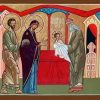Fasting, vigil, and prayer, and all other Christian practices, however good they maybe in themselves, do not constitute the aim of our Christian life, although they serve as the indispensable means of reaching this end.‖ The aim, or end, we are seeking is our salvation; the means to salvation is a life of repentance, part of which includes observant living. Anyone who attempts to make of Orthodox Christian observance an end in itself has missed the point completely, and that Christian risks the very serious pitfalls of legalism, and spiritual pride. Legalism arises when someone believes he can be saved by the observance of rules and regulations. It is very similar to the attitude of the Pharisee who said, ―I fast twice a week; I give tithes of all that I possess…‖ (St. Luke 18:12). The Pharisee was condemned because of his self-righteousness and pride.
The true measure of all things is the Father‘s love for us. We do not try to purchase that love with good conduct. Rather, being in love and to please Him. We must acquire the humble attitude of the prodigal son, an exact icon of repentance, who ―when he came to himself, said, ―…I will arise and go to my father, and will say to him, ‗Father, I have sinned against heaven and before you, and I am no longer worthy to be called your son. Make me like one of your hired servants‖ (St. Luke 15:17-19). Or to possess the orthodox phronema of the Publican ―who…standing afar off, would not so much as raise his eyes to heaven, but beat his breast, saying, God, be merciful to me a sinner..‖ (St. Luke 18:13).
External observance is much easier to achieve…and it is not so hard on the conscience. As a result, some Christians make external observances and outward behavior the whole domain of their spiritual effort in order to give the perception of piety. These people run the risk of becoming the ―whitewashed tombs‖ of the Church. Our Lord and Savior Jesus Christ has taught us not to omit the external things, but to give greater attention to ―the weightier matters of the Law, ―justice, mercy and faith‖ (St. Matthew 23:23), which are ―internal,‖ spiritual realities. Spiritual pride attacks someone who is pleased with his spiritual accomplishments: he says his daily prayers, he tithes, he shows up for all the holy services, crosses himself and prostrates at all the right times, and he takes satisfaction in these things. Having justified himself, he is like the Pharisee, when he should strive to be like the Publican and say, ―I have done nothing good. O God, be merciful to me a sinner.‖
The purpose of fasting is to gain mastery over oneself and to conquer the passions of the flesh. It is to liberate oneself from dependence on the things of this world in order to concentrate on the things of the Kingdom of God. It is to give power to the soul so that it would not yield to temptation and sin. According to Saint Seraphim of Sarov, fasting is an ―indispensable means‖ of gaining the fruit of the Holy Spirit in one‘s life, and Jesus Himself taught that some forms of evil cannot be conquered without it (St. Matthew 17:21; St. Mark 9:20).
Man does not fast because it pleases God if His servants do not eat, for, as the Lenten hymns of the Church remind us, ―the devil also never eats‖. Neither do men fast in order to afflict themselves with suffering and pain for God has no pleasure in the discomfort of His people. Neither do men fast with the idea that their hunger and thirst can somehow serve as a ―reparation‖ for their sins. Such an understanding is never given in the Holy Scripture or the holy writings of the Fathers of the Church which claim that there is no ―reparation‖ for man‘s sin but the crucifixion of Christ. Salvation is a ―free gift of God‖ which no ―works‖ of man can accomplish of merit (cf. Romans 5:15-17; Ephesians 2:8-9).




















